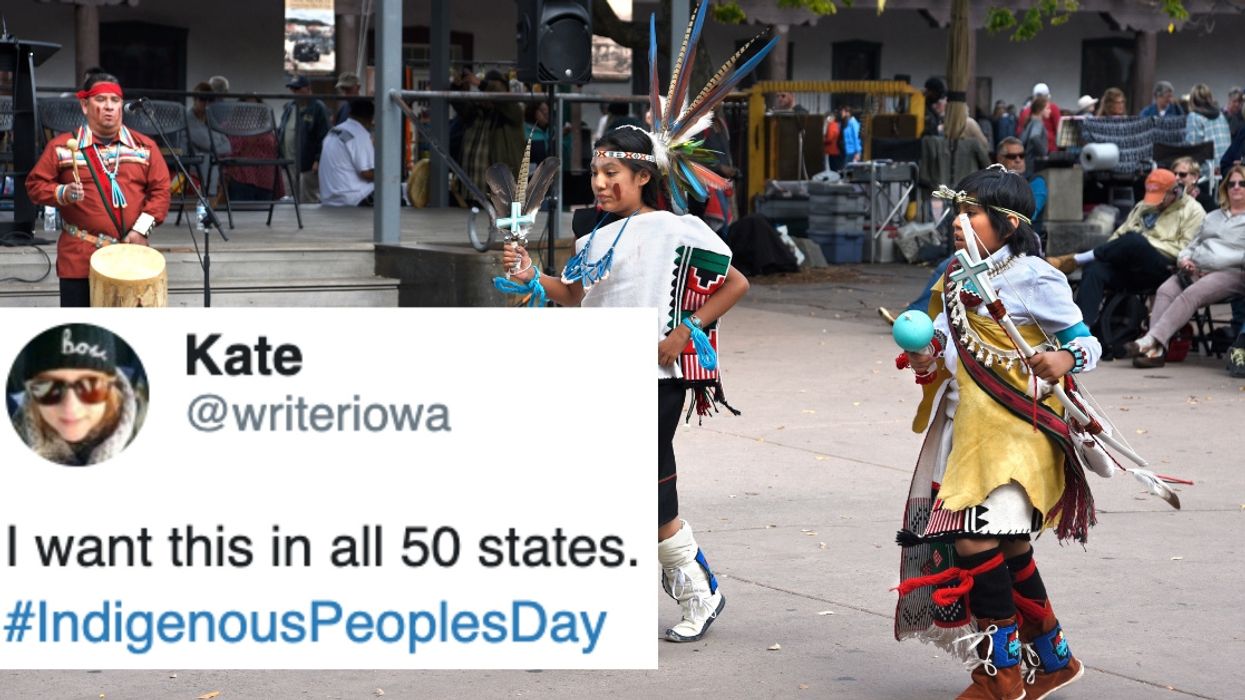New Mexico has just become the newest state to replace Columbus Day with Indigenous Peoples' Day.
Governor Lujan Grisham signed the bill into law on April 4th, making it the fifth state to pass similar legislation.
In a statement given to CNN, Governor Grisham said:
"This new holiday will mark a celebration of New Mexico's 23 sovereign indigenous nations and the essential place of honor native citizens hold in the fabric of our great state."
"Enacting Indigenous People's Day sends an important message of reconciliation and will serve as a reminder of our state's proud native history.
Navajo Nation President Jonathan Nez celebrated the passage of the bill, and thanked Governor Grisham for her support of the movement, in a press release on Facebook.
"The federal government declared Columbus Day as a holiday without input from Native Americans and without knowing the true history of Native Americans. For many years, Indigenous people have protested Columbus Day because it celebrates colonialism, oppression, and injustice inflicted on Indigenous peoples."
"Observing Indigenous Peoples' Day allows citizens to recognize our rich heritage and represents a step toward healing and growth."
Representative Derrick Lente, of Isleta and Sandia Pueblos, also spoke in praise of the law.
"Today, the ancestors are happy. The shift to Indigenous Peoples' Day sends a strong message to the descendants of the people who once were sought to be extinguished that there's a renewed appreciation for their resiliency and contribution to our great state."
"It is a time to reflect on our understanding of our country's history, both the good and the bad. New Mexico's Pueblos, Tribes and Nations are what truly make us the Land of Enchantment. I applaud our Governor for signing this important bill into law so we can properly honor our Indigenous communities."
New Mexico joins Alaska, Minnesota, South Dakota (where it is called Native American Day) and Vermont in celebrating Indigenous Peoples' Day as a state.
There are many cities and other municipalities throughout the country that have chosen to celebrate the holiday too.
There were quite a few calls on Twitter for other states to follow suit.
Several other states have bills in the works to make the change as well, including Maine, where LD 914 passed the Maine House of Representatives on March 19th; it is now on the agenda for the state senate.
There are a variety of reasons to change the holiday. One such reason is what children are taught about the history of the United States while they are in school.
There has been a slow shift in the curricula surrounding America's indigenous peoples, but many schools still teach that Christopher Columbus "discovered America," despite his never having set foot in North America. This is further perpetuated by the holiday celebrating his "discovery."
Opting to celebrate Indigenous Peoples' Day grants teachers an opportunity to teach children about the varied histories of the peoples that were here before Europeans came to the Americas.
It also presents the opportunity for children to learn about the indigenous people who are still here. Much of what is taught about indigenous people frames them in the light of the past, as though they no longer exist.
A study by Dr. Sarah B. Shear, in cooperation with Ryan T. Knowles, Gregory J. Soden & Antonio J. Castro, called Manifesting Destiny: Re/presentations of Indigenous Peoples in K–12 U.S. History Standards found that:
"In performing a mixed methods content analysis of the nation's K–12 U.S. and state history standards, we found that Indigenous Peoples were largely confined within a pre-1900 context devoid of any significant voice."
"The narrative presented in U.S. history standards, when analyzed with a critical eye, directed students to see Indigenous Peoples as a long since forgotten episode in the country's development."
There are currently 573 federally recognized tribes in the United States and many more who do not have federal recognition, each with its own rich and diverse culture and history.
It is only through learning about the past and recognizing the effects that it has on the present that we can hope to improve the future. New Mexico has taken the first step toward this by recognizing the people who have been here for millennia.
















 @JaJa_no_NO/X
@JaJa_no_NO/X @CWMorgan1000/X
@CWMorgan1000/X reply to @spain2323/Instagram
reply to @spain2323/Instagram reply to @spain2323/Instagram
reply to @spain2323/Instagram reply to @spain2323/Instagram
reply to @spain2323/Instagram reply to @spain2323/Instagram
reply to @spain2323/Instagram reply to @spain2323/Instagram
reply to @spain2323/Instagram reply to @spain2323/Instagram
reply to @spain2323/Instagram reply to @spain2323/Instagram
reply to @spain2323/Instagram reply to @spain2323/Instagram
reply to @spain2323/Instagram reply to @spain2323/Instagram
reply to @spain2323/Instagram reply to @spain2323/Instagram
reply to @spain2323/Instagram reply to @spain2323/Instagram
reply to @spain2323/Instagram reply to @spain2323/Instagram
reply to @spain2323/Instagram reply to @spain2323/Instagram
reply to @spain2323/Instagram reply to @spain2323/Instagram
reply to @spain2323/Instagram reply to @spain2323/Instagram
reply to @spain2323/Instagram reply to @spain2323/Instagram
reply to @spain2323/Instagram